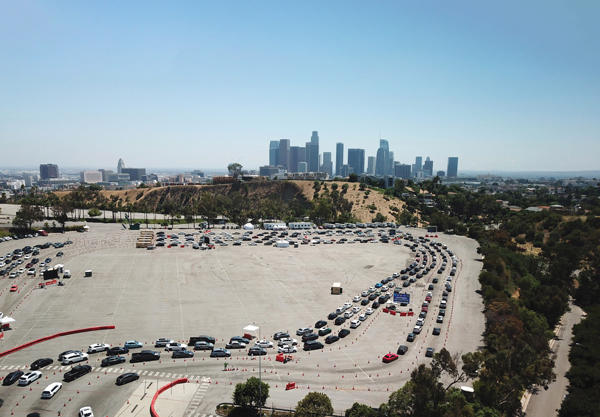In just a matter of weeks, major markets reopened and shut back down.
Throughout California, Florida and many other states, the alarms have been ringing once again — especially for retail, hotel and other commercial property owners in big cities. This time around, bars and restaurants have been serving as the canary in the coal mine for many consumer-facing businesses.
California Gov. Gavin Newsom announced on July 13 that he’s putting a “dimmer switch” on the state’s economy, including banning dine-in at restaurants and other indoor activities at wineries, movie theaters, zoos, museums and card rooms.
Newsom’s executive order also shuts down indoor activities at malls, gyms, barbershops, salons and places of worship in counties that have shown a higher rate of coronavirus infections, including many of the counties around Los Angeles. And all California bars that had reopened are, once again, ordered closed.
In Florida, many had expected the state’s heavily pro-business agenda to keep things open. But bars, restaurants, fitness centers and short-term rentals in Miami and other Florida cities were hit with heightened restrictions this month due to the record number of coronavirus cases throughout the state. Now South Florida’s hotel owners are struggling to figure out how to keep operations afloat.
In New York, the city is still on its slow and steady path to fully reopening in multiple phases under state orders with relatively lower case counts. But the latest Covid news could have significant impacts on the Big Apple as well. At the same time, uncollected rents are mounting for many retail, office and other landlords in the city.
Here’s a closer look at the numbers as the pandemic shows little sign of slowing down.
3.5M
 The number of reported Covid-19 cases throughout the U.S. since March. The country saw a record 67,417 new cases on July 14, data from Johns Hopkins University shows, while 38 states reported an increase in the number of new cases from the week before.
The number of reported Covid-19 cases throughout the U.S. since March. The country saw a record 67,417 new cases on July 14, data from Johns Hopkins University shows, while 38 states reported an increase in the number of new cases from the week before.
$28B
The total amount that JPMorgan, Wells Fargo and Citigroup have collectively stockpiled to cover potential loan losses, according to the Wall Street Journal. The banking giants are bracing for deeper impacts from the growing recession being fueled by the pandemic in the U.S.
6,500+
The number of U.S. landlords, developers, real estate investment firms and private equity players that have received PPP loans intended to safeguard companies and their workers from the pandemic’s ongoing economic fallout. Developers and landlords were excluded from the federal program, but some used loopholes — such as applying through related business arms like property management — to access the funds (see page 24).
1/2
 The share of Miami restaurants that could succumb to the latest pandemic impacts and government restrictions, restaurant broker Felix Bendersky told TRD. Florida set a new single-day U.S. record of 15,300 reported Covid cases on July 12 as the state’s totals continued to skyrocket, prompting the new rules. Now vulture investors are circling in search of dying businesses and available space.
The share of Miami restaurants that could succumb to the latest pandemic impacts and government restrictions, restaurant broker Felix Bendersky told TRD. Florida set a new single-day U.S. record of 15,300 reported Covid cases on July 12 as the state’s totals continued to skyrocket, prompting the new rules. Now vulture investors are circling in search of dying businesses and available space.
4.8M
The number of jobs the U.S. economy added in June, according to the latest monthly Labor Department report. That increase drove the unemployment rate down to 11.1 percent. At the same time, roughly 1.4 million people filed jobless claims late last month — marking the 15th week in a row of claims that exceeded 1 million.
87.6%
The portion of U.S. tenants who paid some of their rent through July 13, according to a survey of more than 11 million market-rate units by the National Multifamily Housing Council. With enhanced unemployment benefits set to expire this month, the number of renters paying at least some of the month’s rent was only slightly below the 90.1 percent during the same period a year ago.
11,142
The number of new Covid cases in California, reported by the Los Angeles Times, on July 14 — the day after Gov. Newsom announced that malls and other retail outlets in most of the state’s counties would need to shut down indoor activities for a second time. As malls in Los Angeles County reopened for a short stint in June, lawyers were already nervous about a second Covid wave and potential lawsuits.
27,000
The number of food and beverage establishments in New York City — many of which had rushed to restructure their business models for takeout after the pandemic hit. But with indoor dining still banned throughout the city, there’s little hope that the backlog of rent payments will be cleared anytime soon.

